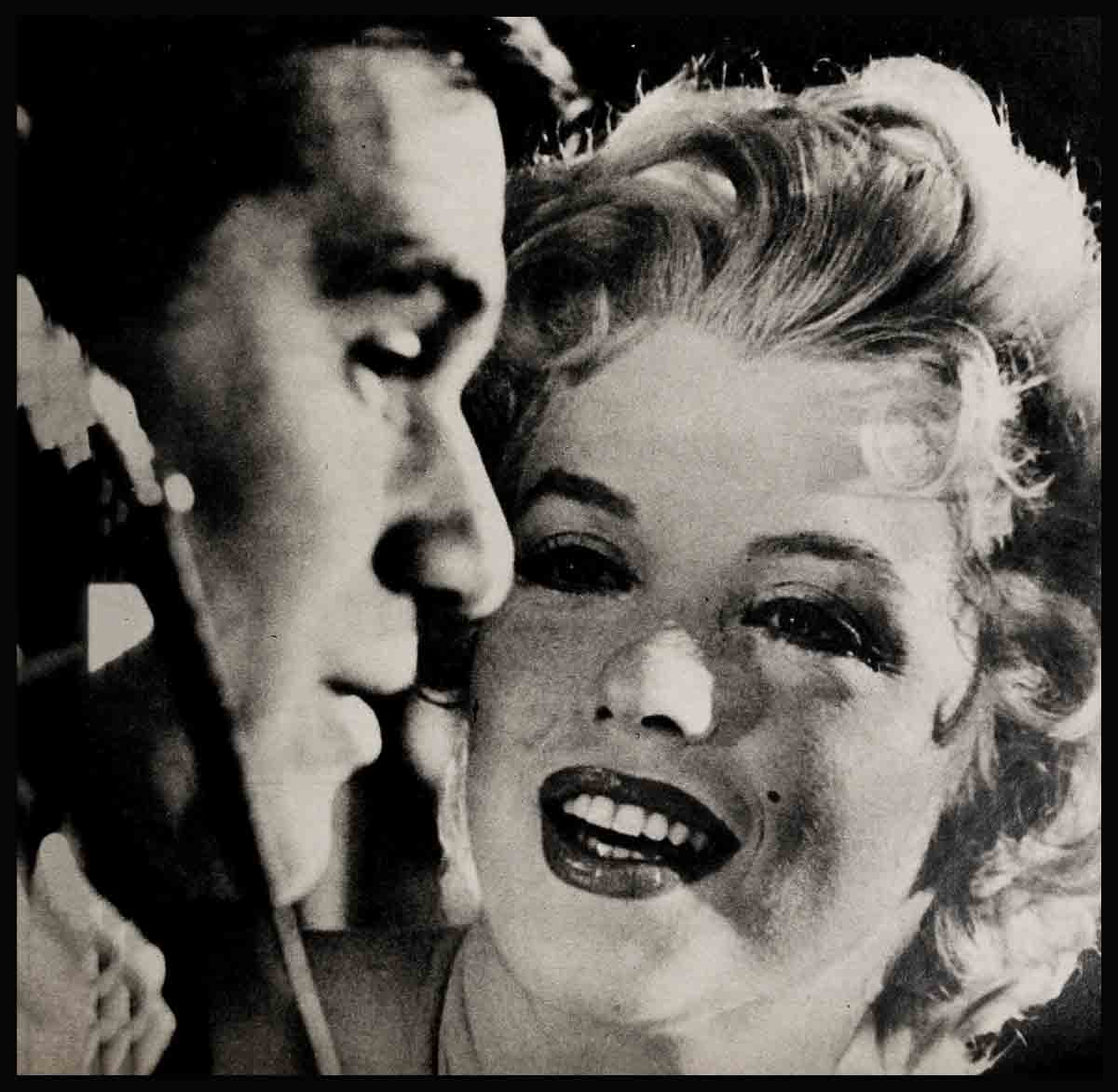
Marilyn Monroe: “I’ll Never Be The Same”
The most exciting girl I know—in all the world—is Marilyn Monroe.
First, she’s exciting because in spite of having the guts (no politer word will do) to gamble on herself the way tough, aggressive business executives do, she’s still shy and uncertain. She reminds me, so often, of the girl who stays on and on in the powder room, fluffing her dress, combing her hair and repairing her make-up—to postpone the moment she must join the party and sink or swim.
Secondly, she’s exciting because she aspires to work with the greatest, as she will when she makes The Sleeping Prince with Sir Laurence Olivier. Be it said to her undying credit that at her New York press conference with Olivier she did not, in an effort to live up to this elegant occasion, imitate his clipped British tones or broad “A’s” but talked with quiet naturalness. However, her clothes for this conference were all wrong. She was dressed like the movie character the movie producers wanted her to be and which she refused to remain.
Thirdly, she’s exciting because she’s so hungry—greedy almost, but not quite—for all the wonderful things in the world, things like association with stimulating people, fascinating books, a chance to see the planet she lives on, a knowledge of music and art and food and wine. Like a child with a big box of candy she can’t quite decide which treat to sample first.
All of which brings me to a bet I made on Marilyn. It was about two years ago . . .
“You’re a fool to be photographed with Monroe,” The Man said. He was an executive of Twentieth Century-Fox, the movie company from which Marilyn had just bowed out of a contract that still had seven years to run. “You keep writing about her in your newspaper column, too! You don’t seem to get the idea that she’s on the way out. A year off the screen and she’ll be washed up! We can find a dozen like her!”
“I laughed at him. “You’ll never find a dozen like her!” I said. “You may find a dozen beautiful hunks of protoplasm topped off with blonde hair. But they won’t be Marilyn Monroes. Wait and see—you’ll be glad to have Marilyn back on her terms.”
“One hundred dollars says you’re wrong!” The man was scornful.
“One hundred dollars says I’m right!” I was reckless.
I had, at this time, met Marilyn only once, and briefly. But sometimes your bones tell you about people. And I had been impressed with Marilyn’s endearing qualities. Sir Laurence Olivier described her so well at that press conference. When a reporter, plainly flabbergasted at the rate at which this little Hollywood blonde was climbing, asked Sir Laurence why he was so sold on Marilyn, he answered:
“She is an expert comedienne. Therefore she must be a good actress.
“And she has the extraordinarily cunning gift of being able to suggest one minute that she’s the naughtiest little thing alive and the next that she’s beautifully dumb and innocent. So—the audience leaves not knowing quite what she is.”
It couldn’t be said better.
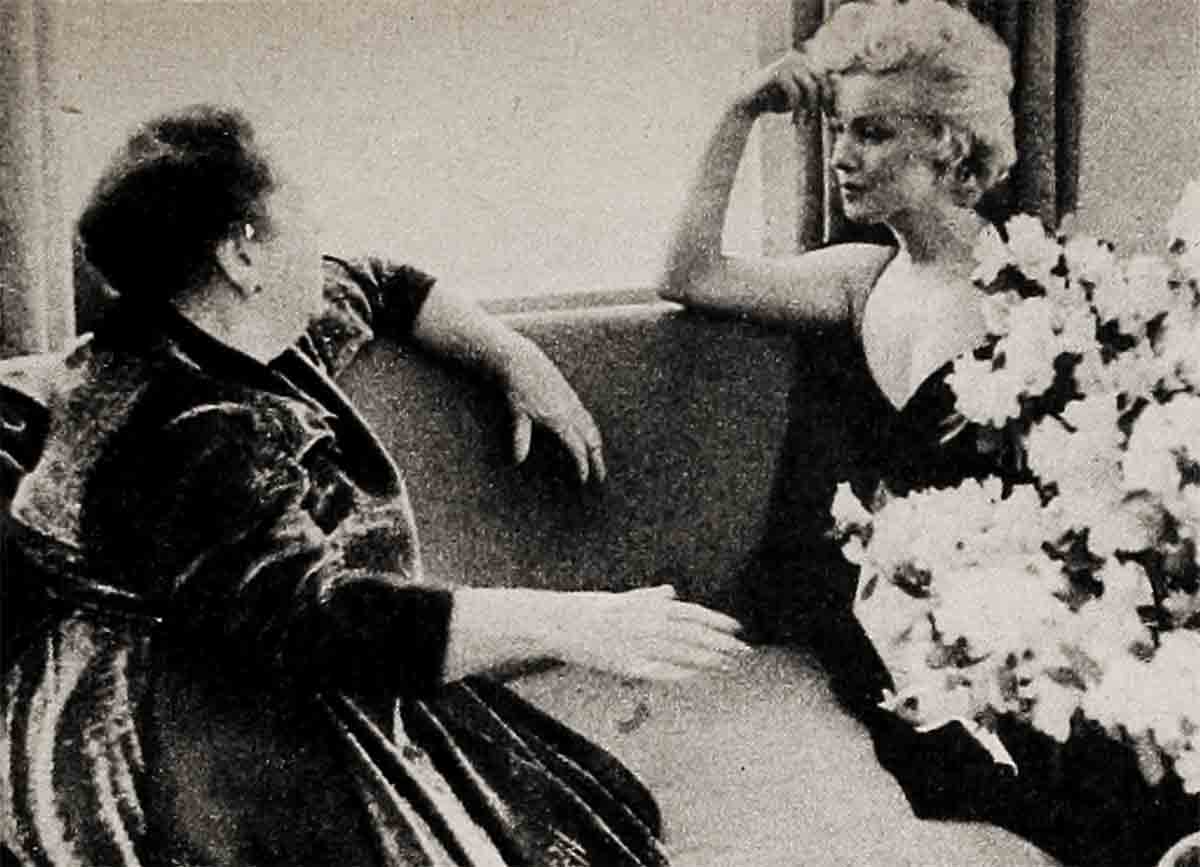
The grand entrance
I met Marilyn first when she received the New York press to announce that she had quit 20th.
Reporters and cameramen blocked the sidewalk. And inside the elect of the press milled about impatiently. Marilyn was late. Marilyn always is late.
At last Marilyn came inside. She was wearing a white satin dress with tiny straps and a piece of white fur. “Why,” I wondered irritably “don’t the Milton Greenes who are her good friends—with Milton a fine fashion photographer—help her with her clothes?” Then I forgot she was dressed all wrong, because—curiously enough—she wasn’t vulgar in this costume. She was more like a little girl, in spite of her twenty-nine years, who was trying to appear sophisticated and grownup.
She reminds me of a fawn, without really looking like one. She radiates health and vitality. And I find something wistful in her eyes and remember her years as an orphan when she was boarded out with different families and many times treated as a little slavey.
“I’ve never told all about my life,” she admits to the few she knows well. “No one would believe it all could have happened. They would say I was talking for publicity. It was pretty terrible . . .”
I said to Marilyn, “It must have taken courage to quit Hollywood as you did, to give up all the luxury, the money, the importance—after being so very poor. . . .”
“No,” she said softly. “No, Elsa, it didn’t take any courage at all. To have stayed took more courage than I had.”
I felt dull-witted, I remember, protesting, “But I don’t understand!”
“All any of us have,” she said, “is what we carry with us, the satisfaction we get from what we’re doing and the way we’re doing it. I had no sense of satisfaction at all. And I was scared.
“I know that I always tire of anyone who’s the same all the time. So I could see how people soon enough would get tired of me—with the only difference in my screen roles being that in one picture after another I wore pink tights or yellow tights or green tights.
“And by the time this happened I figured I would have become accustomed to having a little luxury and security—so I really would be in trouble.
“Now—well, I’ve never made much money, considering what I’ve had to spend. I don’t own even a little diamond the size of a pinhead. And I have one fur coat which my husband—I mean my ex-husband—gave me.
“It didn’t take any courage to quit. Really it didn’t!”
It makes no sense at all, of course, for a girl who looks like Marilyn to sit quietly and talk like this in a soft little voice that is seductive only because it comes out of her. This is much more the sort of thing you would expect from a bespectacled, studious, teeth-in-braces “Brain.”
However, I’ve lived long enough to know life doesn’t always stick to the rules; that the perfectly impossible and absolutely ridiculous keeps happening all the time.
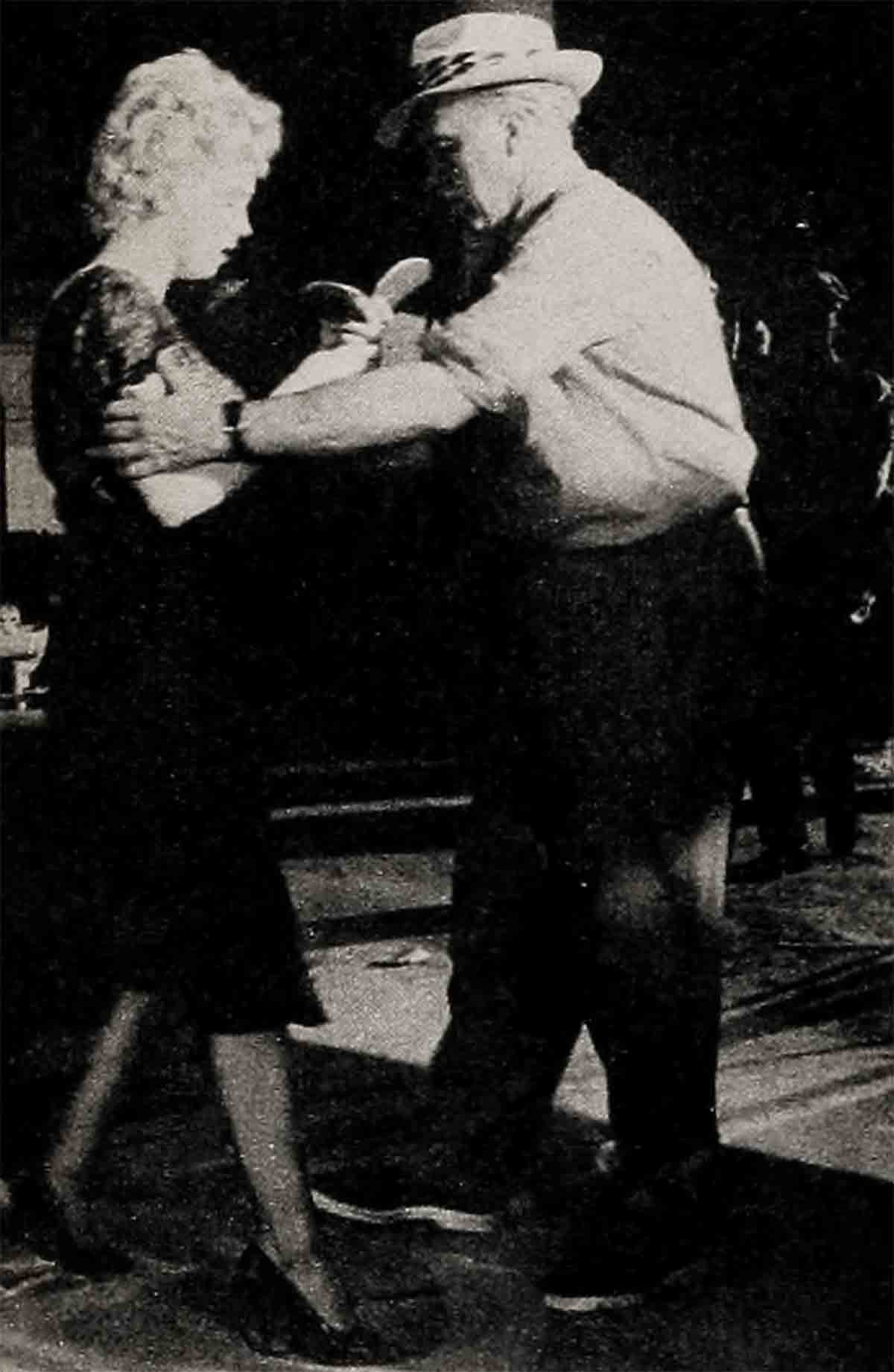
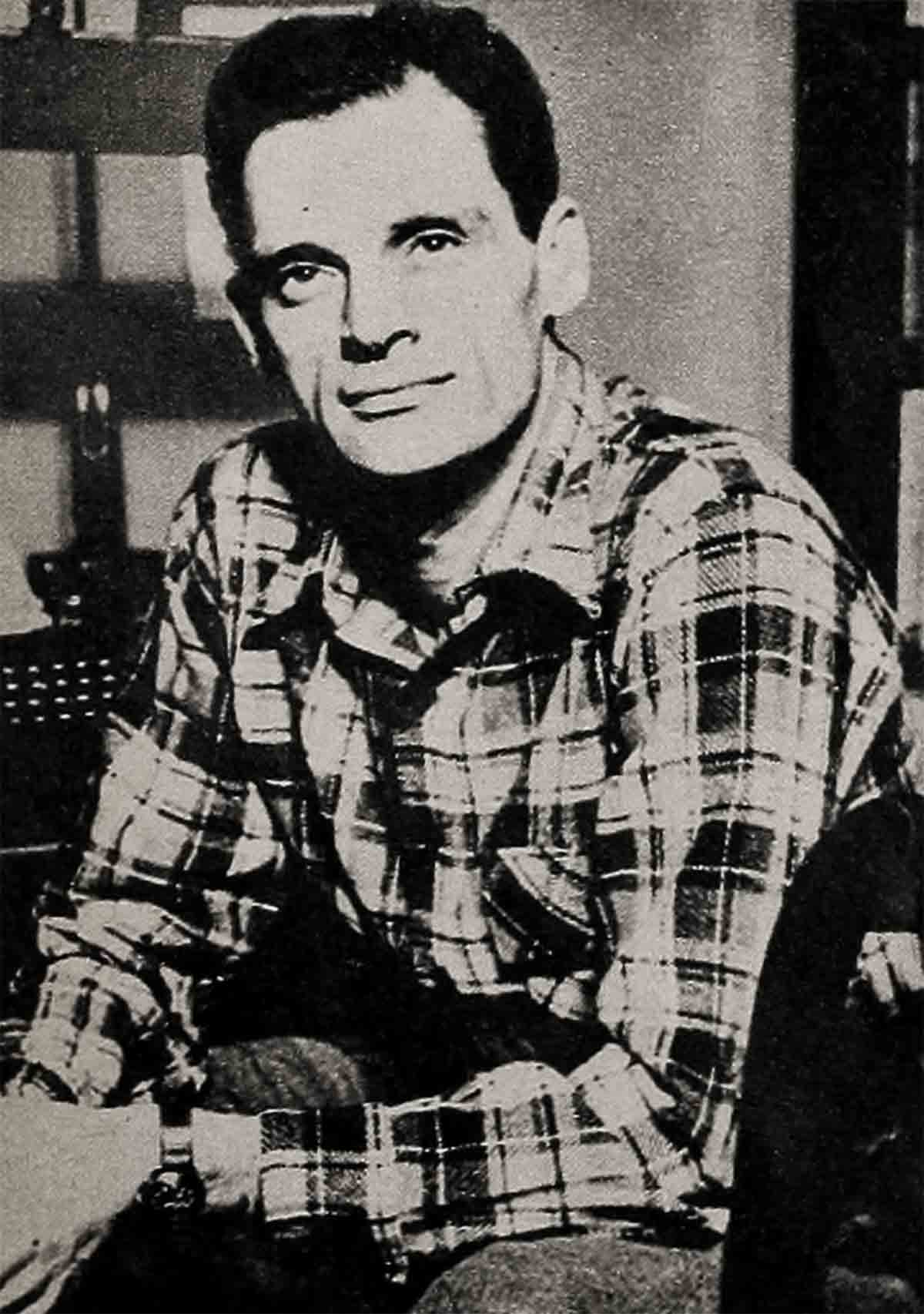
The ersatz Monroes
We met again and again, Marilyn and I, as the months went by. Always there was something sweet and quiet about her that got into my heart. Meantime, of course, the would-be Marilyn Monroes were appearing on every hand; brash young women, most of them, with over-developed curves and too much, too blonde hair.
Some may look remotely—and I do mean remotely—like Marilyn Monroe. They may successfully have imitated Marilyn’s walk and other physical characteristics. But there—take my word for it—all resemblance ends. In mind and spirit—which are the very essence of any human being—Marilyn and the ersatz Monroes are as far removed as I am from the Venus de Milo.
Always Marilyn was late arriving at parties. “Marilyn Monroe’s coming . . .” The excited whisper would be everywhere. Then you’d hear people saying, “Guess she isn’t coming after all. She’s working like a Trojan these days. Gets to the Actors’ Studio early and stays late—just sits watching if she isn’t doing anything herself.”
All they said was true. But Marilyn usually would arrive later on.
I heard, too, about the nightmarish time her associates had getting her to the Plaza the day she appeared with Sir Laurence—to tell the press about their plans to make The Sleeping Prince in England this August. The Sleeping Prince, of course, is the Terrence Rattigan play in which Sir Laurence and his wife, Vivien Leigh, enjoyed such success in London. Mr. Rattigan is writing the screenplay which Sir Laurence will direct and co-produce with Marilyn Monroe Productions, Inc.
“What happened?” I asked someone who was with Marilyn that morning.
The friend smiled. “The usual thing. At the last minute, just before we were ready to leave, Marilyn decided to change her dress. Then she had to redo her hair.”
I’m bored with people who go around offering psychological explanations for everything. But in Marilyn’s case I think the psychology is pretty obvious.
She had the courage to challenge the big movie moguls. She has the ambition to want to know and work with fine artists. But she’s also, as I said earlier, like The Scared Young Thing who stays on and on in the powder-room to postpone everything she has worked for and looked forward to.
I was fascinated to see this same pattern apply the day Marilyn and her company were scheduled to leave on an early morning plane for Phoenix, Arizona, where the first scenes for Bus Stop were filmed. Her associates, aware of the perpetual difficulty of getting her anywhere on time, packed her bags the night before. But this didn’t work. For, a few minutes before it was time to leave, she changed her mind about her traveling costume, unpacked, and missed the plane.
It was inevitable that this would happen. After two long years of revolt she had within her grasp all she had fought for. Josh Logan, that genius with the talent too many “geniuses” lack, was her director. Dan Murray was her co-star. She had a distinguished cast to support her. So she was scared and, like the girl in the powder-room, she sought—consciously or subconsciously—to postpone that moment when she must join the party.
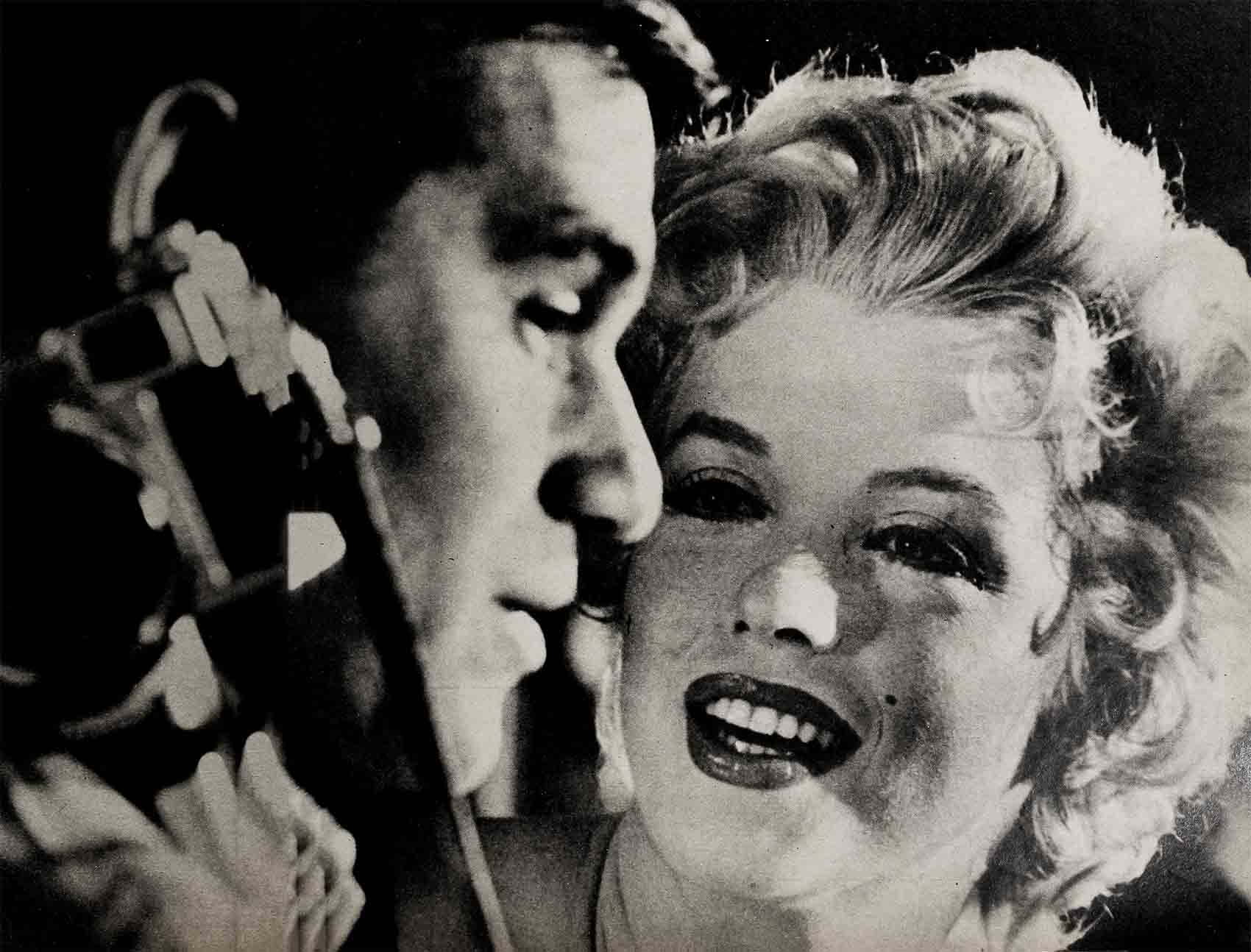
I win
It was, incidentally, when Marilyn left for Hollywood to make Bus Stop that I collected my hundred dollar bet from The Man. No one—certainly not The Man, beaming and boasting because his company finally had a contract guaranteeing Marilyn would make four pictures for them during the next seven years—could doubt that ’’d won hands down.
For Marilyn has everything she wanted. Among other things she has the right to make outside pictures such as The Sleeping Prince, which will be released by Warner Brothers and she has the right to approve her director. Not her scripts, mind you, but her director. This I find a perfect example of her simple directness. She feels she might not be up to judging what a story or even a shooting script would turn out to be. But she can assess a director’s reputation by what he has done before. And if a director’s reputation is as excellent as Josh Logan’s, for instance, she can depend upon any story that gets his blessing.
Lunch with Marilyn
Before Marilyn left for Hollywood we lunched at my apartment in the Waldorf Towers. True to form, she arrived over an hour late. She wore the same improper clothes she had worn to her press conference with Olivier, the low cut black velvet suit with the dress supported by tiny shoulder straps, dangling earrings and with her blonde hair flying. (Remember at the press conference how one of the tiny shoulder straps broke, causing a stampede among the photographers?)
Upon both occasions Marilyn would have been so much better groomed in a well-fitted suit, with her hair held firm. Her face would be more important with less hair about. And, in spite of her other charms, this would be desirable. For the planes of her face are young and curving and her eyes, unless they’re smiling, are dramatically sad.
I wanted to say, “Oh, Marilyn, my dear, those clothes! They’re not right for noonday!”
But she was so excited about all that was happening—with a photographer for The Saturday Evening Post trailing her to report a day in her life with his camera—with the famed Cecil Beaton, photographer of The British Royal Family, awaiting her in his studio for a portrait sitting for Harpers’ Bazaar—that I didn’t have the heart to criticize her.
It could be, of course, that I wouldn’t have fazed her at all. She has a strong mind of her own. And, since for the last two years she’s been exposed to the best dressed women in New York, it could be she feels her clothes are right for Marilyn Monroe, publicity-wise at least.
Also we had so many other things to talk about.
Men
I had, with some difficulty, warded off eight men who knew Marilyn was coming to lunch. One by one they had discovered they simply had to see me about something important and, not at all curiously, the only time they had free was midday.
When I told Marilyn about this she laughed.
“If they wanted to see me, Elsa, they were no longer young. Or else they were very young. Only older men and very young boys like me.”
When you’re exploited, as Marilyn is, as being the very essence of sex, I suppose you feel no need to prove your prowess in this department. Marilyn certainly doesn’t. You read very few romantic items about her, except for an occasional mention of Arthur Miller, the playwright, who has, off and on been her escort.
I asked Marilyn about Arthur Miller the other day when she telephoned me from Hollywood. I had read that he was leaving for the coast, to be with her.
“I’ll tell you this, Elsa,” she said. “I like Arthur very much. And I’m proud to have such a great playwright for my friend. I’ve had very few friends in my life, as you know.”
“I hope one day you marry him,” I interrupted.
“You’re wonderful!” She laughed happily. “Unfortunately we haven’t reached any such serious stage—yet . . . I don’t say I won’t marry him. But I tell you, honestly, I have no plan to marry him—now . . .”
She was full of enthusiasm about the way Bus Stop was going.
“To work for a director like Josh Logan,” she said, “that’s something!”
I told her of a compliment she had had from Franchot Tone. The evening before, talking to Franchot about the Actors’ Studio, I’d described Marilyn’s joy at working in Anna Christie with Maureen Stapleton, how she had said, “Maureen’s such a wonderful actress! I learned so much from her.”
“Let me tell you something,” Franchot had countered. “Maureen’s a great actress. No doubt about that! But when she and Marilyn played Anna Christie Marilyn gave an even finer performance.”
There was a breathless pause on the wire when I stopped talking. Then came a whisper that sounded down-right frightened, as if Franchot had committed a sacrilege in saying such a thing.
“Oh, no . . .” Marilyn said. “Oh, no, Elsa . . .”
Marilyn admits she is lonely at times and that she is unhappy that her marriage with Joe DiMaggio did not work out. She takes the idea of having children very seriously. It may well be her unhappy childhood haunts her when she says, “I wouldn’t like to have a child unless I felt myself able and fit to bring it up. It is so difficult for boys and girls who do not have the right surroundings, or the right example in a mother and father.”
“I’ll never forget”
A friend, a former editor, joined us that day. She has known Marilyn for years, ever since Marilyn played the little blonde whom Groucho Marx chased in Love Happy. There never has been a time when this friend has not been able to count on Marilyn’s cooperation and friendship. She said something of this to Marilyn, appreciatively.
“But how could I do otherwise—after that trip we went on, remember . . . when that prize house was presented to a contest winner way up in New York state? She was a war widow, with a little boy, remember? And she was on crutches because she’d had a skiing accident.
“I’ll never forget how we saw Monty Woolley—beard and all . . . He was getting on the train at Albany when we got off. Remember? And remember that nice steward in the diner? We did send him the autographed pictures, I hope . . . Oh, I remember we did.
“And that man who handled the broadcast of the presentation ceremonies . . . Wasn’t he wonderful at handling crowds?”
There was no detail so small that Marilyn did not recall it. No Great Star, she, who stands aloof and elegant while she looks at the world merely as something that revolves around her.
She has so much to offer in the human department. Which is why those who seek to replace her fall so far short of the mark. They lack that little extra portion which at once made Marilyn a star and then sent her running from stardom to learn the business of acting so that her fame, instead of being a flash in the pan, might survive.
As I write Marilyn is living in Beverly Hills with the Milton Greenes, just as she planned to do that day we lunched.
“I enjoy being with the Greenes,” she told me. “They’re kind and stimulating people. Moreover, they have a wonderful cook. I want to learn to cook. And their Kitty has promised to teach me.
“I want to be able to turn out a souffle that is high and crusty and savory. I want to learn to flip an omelette.”
She twisted her hips and looked at me over her shoulder as she spoke—in imitation of her screen personality, laughing as she mocked herself.
The little orphan slavey who spent the first years of her life washing other peoples’ clothes and dishes has come a long way. So has the little blonde who spent the first years of her movie life being famous for her bosom and the way she walked.
I often wonder about Marilyn’s family tree. There must be an ancestor or two tucked away who is responsible for the native intelligence that lies under her blonde hair, and the warm heart that lies beneath her curving bosom.
In the world today there are far too few exciting people. Everybody wants to play it safe, to get as much as they can for as little as possible. It’s good to meet someone who tilts at windmills—or movie titans—who risks everything rather than be swept to oblivion on a golden tide.
All of which is why, to me, Marilyn Monroe—just as I said when I began this story—is the most exciting girl in all the world.
THE END
—BY ELSA MAXWELL
It is a quote. MODERN SCREEN MAGAZINE JULY 1956




